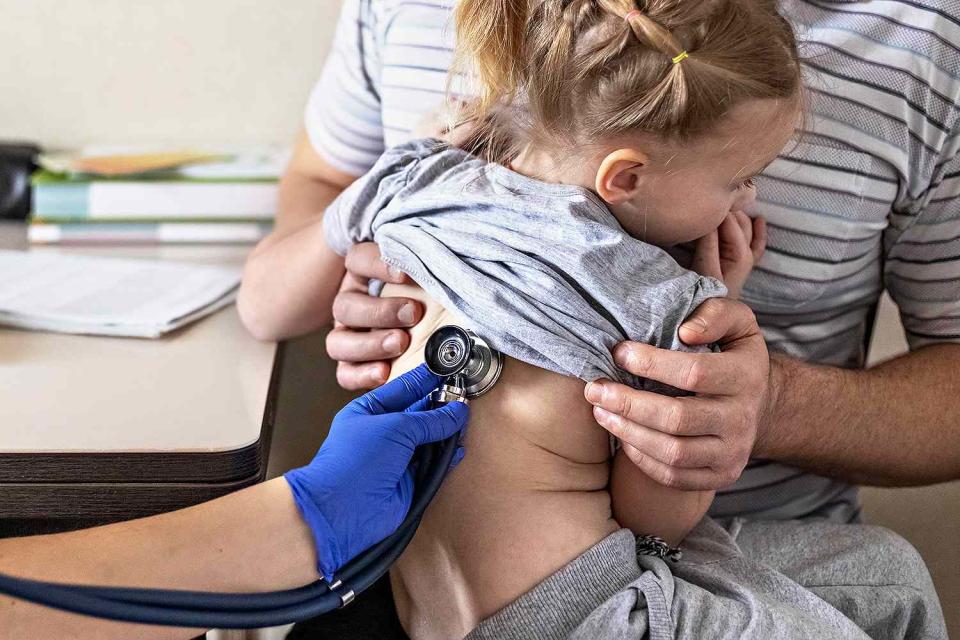Some States Reporting a Dramatic Rise in RSV: Here's What You Need to Know About the Respiratory Virus

Getty A child at a doctor's appointment
Some states are seeing an unusual increase of cases of RSV, or Respiratory Syncytial Virus. The illness is common and is the typical cause of bronchiolitis and pneumonia in kids under 1 years old.
The CDC advised parents and doctors to keep an eye out for cases of RSV, particularly in young children, adults over age 65 or those with chronic illnesses.
Here's what to know about the easily-spreading RSV germ.
RELATED: CDC Issues Health Advisory as RSV, a Common Respiratory Illness, Spreads Across Southern States
It transmits like COVID-19
RSV germs typically spread by coughing and sneezing.
"The reason why it's spreading now is unclear, but likely relates to the reason we didn't see much RSV and influenza in the winter: masking, distancing and good handwashing," says Dr. Elizabeth Murray, a pediatrician specializing in Pediatric Emergency Medicine and Child Health Advocacy and a member of PEOPLE's Health Squad. "As those precautions start to go away, we can expect germs to return."
And because the two viruses are similar, it can be tough to diagnose RSV.
"For now, a COVID-19 test is needed" to eliminate that as a possibility and diagnose someone with RSV, says Murray. "It's too hard to distinguish between the two without a test now that both germs are circulating."
RSV primarily affects the respiratory system
"RSV is notorious for causing wheezing and a ton of mucous in little children," Murray explains. "It often starts with a runny nose and maybe a fever, then often gets worse around day 3 to 5 of illness. It causes what is called bronchiolitis, which is different from bronchitis, meaning irritation and inflammation of the smaller airways in the lungs. This causes children to wheeze and have all sorts of noisy breathing."
Because RSV is a virus, there's no direct treatment like antibiotics, which are for bacterial infections. The best treatment is rest and fluids, but parents should closely monitor their child's breathing.
"The concern comes when the child's oxygen level drops or they are breathing too hard to eat or drink normally," she says. "But the good news for parents is that the concerning symptoms are not subtle. If your child cannot eat or drink normally or is having trouble breathing, they need to be evaluated by a medical professional."
RELATED: Common Respiratory Virus Lands 14-Month-Old in ICU: 'I Freaked Out,' Says Toddler's Mom
That advice changes, though, for newborns.
"One key difference is that newborn infants — those under 2 months of age — can have almost no symptoms but become critically ill," Murray says. "It's yet another reminder to limit visitors when you have a newborn to hopefully decrease the likelihood of passing RSV or another germ onto a baby."
And adults need to be cautious too. Though RSV presents as nothing more than a runny nose for typically healthy adults, "for the elderly or adults with other medical problems, it can be very serious, causing about 177,000 hospitalizations in those over 65 annually, according to the CDC," says Murray.
Preventing RSV
To avoid getting sick with RSV, the precautions are similar to what we've learned to do during the COVID-19 pandemic.
"Anyone can catch RSV. The pandemic has done a great job at making everyone acutely aware of what they touch and how they interact with others," Murray says. "Parents should continue to ensure good hand washing, including when coming home from camp or school or outings, and keep kids home when they are sick."
RELATED VIDEO: Here's What You Need to Know If You Get the Flu
"The suggestions for adults are going to be the same," she adds. "Continue to wash your hands, especially before meals and when coming home, and stay home if you are sick."
Murray is disappointed that RSV is coming around in the summer months, but explains that it's a common virus that "has been around for a long time," that doctors know how to manage.
"This is the germ that normally, along with flu, fills every children's hospital each fall and winter," she says. "It was unusual that we did not see any RSV this past winter, however we know why. Now that we are lifting the restrictions that helped prevent it, it should not be unexpected that it has returned."

 Yahoo Finance
Yahoo Finance 